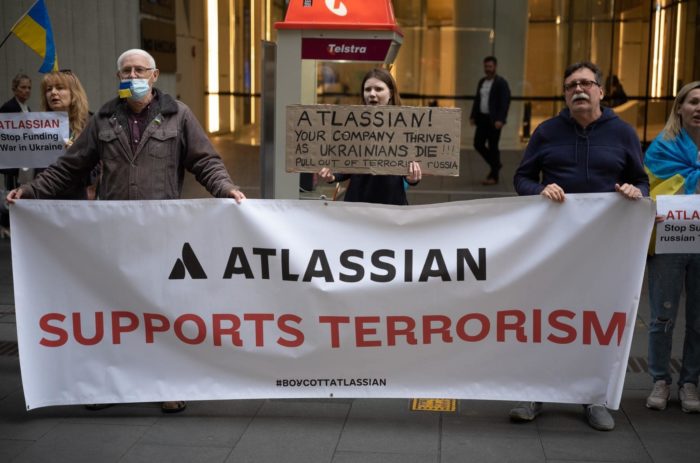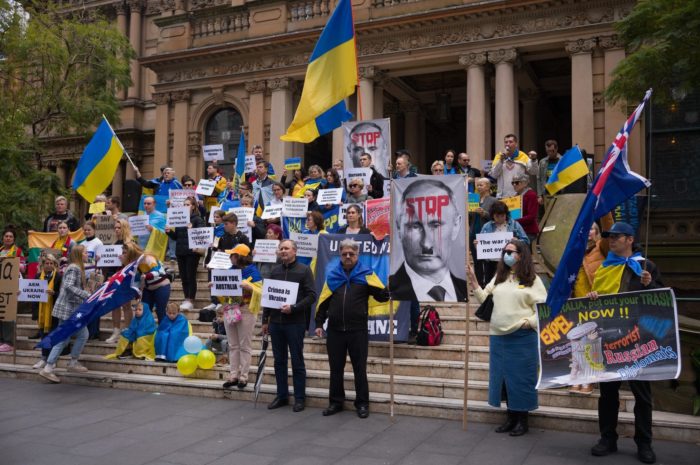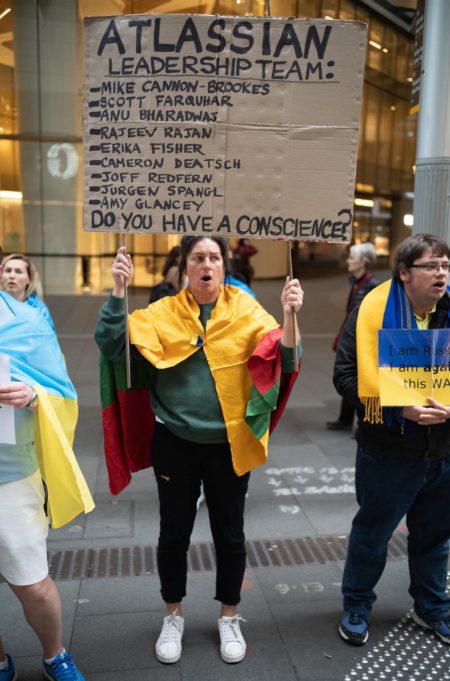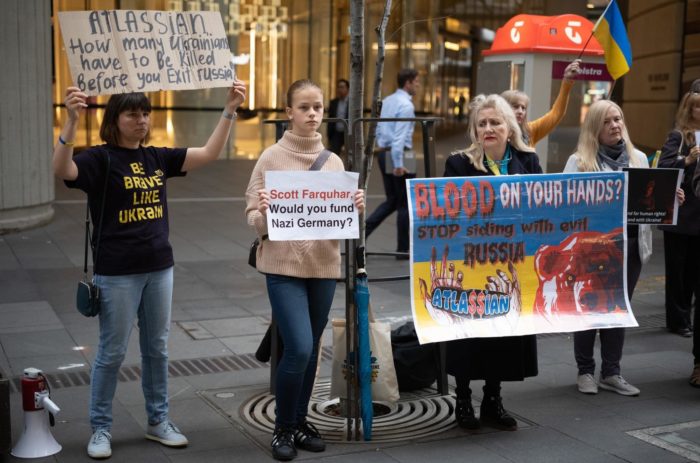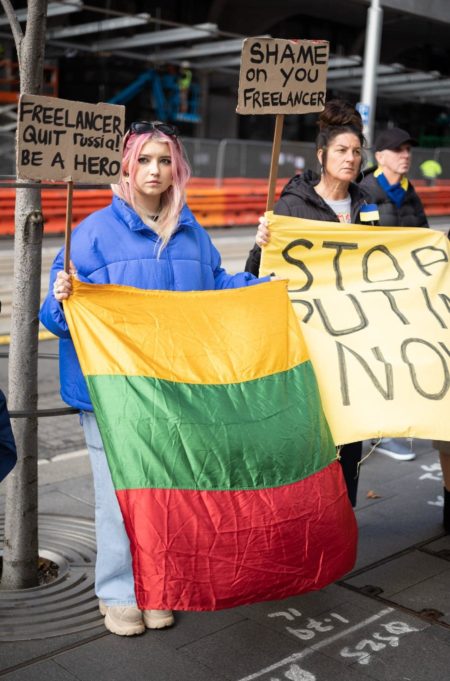With over 1,000 companies ceasing operations in Russia, including household names such as Adidas, Shell, American Express, and Mcdonald's, the spotlight is on those who remain. The Ukrainian community in Australia is working relentlessly to ensure that no stone is left unturned and that all major businesses still operating in Russia cease operations. Recent wins for campaigners include the departure of software companies Canva and Atlassian from the Russian market and while there is cause to celebrate, campaigners are already gearing up for their next campaign.
Euromaidan Press spoke to Anton Bogdanovych, an activist based in Sydney who has been at the forefront of campaigns pressuring Australian companies to leave the Russian market.
How the Ukrainian community flushed Australian company Atlassian out of Russia
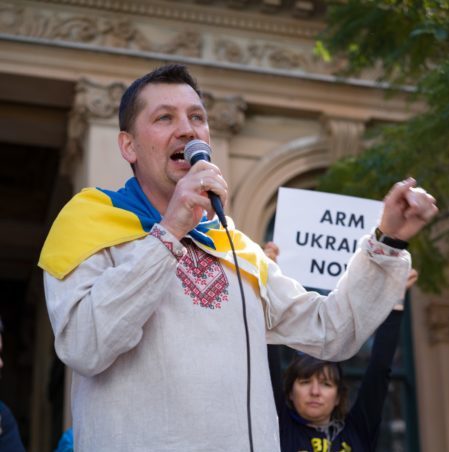
Anton said that tactics employed by the Ukrainian community have included launching protests outside company headquarters, mounting media campaigns, enlisting the support of “influencers” and using the Ukrainian embassy in Canberra as a channel to apply pressure on companies. Although Anton is based in Sydney, his team operates and coordinates activities with other activists across US cities such as Austin, Boston, San Francisco, and New York City.
Anton, commenting on why he thinks it is important to hold private companies to account says that “war is not only a fight between soldiers and weapons but also a competition of economies.” He adds that “the sooner the Russian economy collapses, the sooner this war ends” and pressuring companies to divest from Russia and cease trading is integral to this aim. A collapse of the Russian economy would make sustaining the war effort no longer sustainable in the long term and the Russian Government will be left with little choice but to scale down its operations or cease them altogether.
Anton’s team scored a significant win on 30 September when Atlassian, a software company founded in 2002 and specialising in developing tools for software developers and project managers are known for products like Trello, Confluence and Jira, announced they were ceasing trading in Russia. However, the successful campaign was not an easily won.
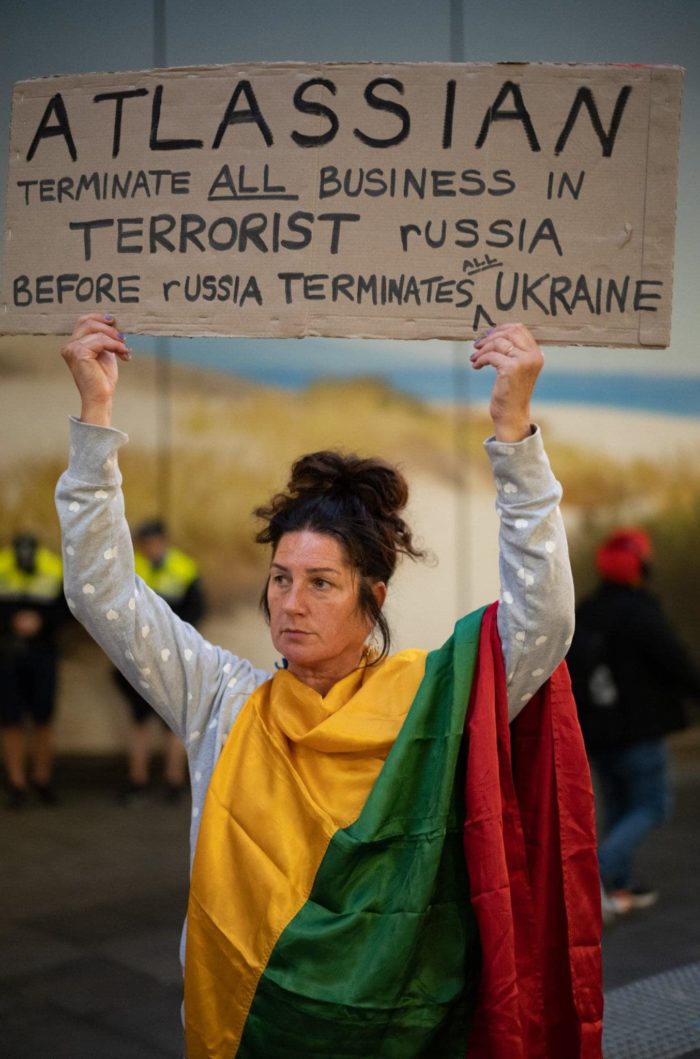
The company’s Co-CEOs and Co-Founders Scott Farquhar and Mike Cannon-Brookes were quick to respond in March following the invasion, saying in a statement “We condemn the actions of the Russian government, and we stand with Ukraine and its people in their fight to maintain their freedom and sovereignty.”
Atlassian announced that it was pausing the sale of all new software to Russia and was suspending existing Russian government-owned licenses as well as licenses to specific Russian businesses that support the war. However, their pledge to support Ukraine fell short when the company stressed that it was not terminating its relationships with its small businesses in Russia, stating that it believes “focusing on businesses with positions of power and influence is the best way to live our mission and values.”
Atlassian’s decision to continue business in Russia immediately brought protestors to the doorstep of its headquarters in Sydney. The company, valued at $54.46 bn, sought to curb public anger with a promise of a $5 mn donation to causes supporting Ukraine as well as free licenses of its products to the Ukrainian government. However, this did little to change the public mood with protests continuing throughout the summer and activists accusing the company of putting profits before Ukrainian lives.
For Anton and his team, donations were met with little enthusiasm, and activists remained relentless in their aim of securing Atlassian’s full withdrawal. Speaking just days before Atlassian’s departure from Russia, Anton had said the company is “strongly positioned to make a substantial contribution to stopping the war” and that “the vast majority of IT businesses [in Russia] use Atlassian products, withdrawing from Russia would mean chaos if not the collapse of Russia’s IT sector.”
Moreover, the company had been inconsistent with its messaging around its support for Ukraine with donations coming much later than anticipated and the company had made false claims around its engagement with Ambassador Vasyl Myroshnychenko.
Eventually, Atlassian bowed to pressure from the Ukrainian community, announcing on 30 September that “we have concluded we can no longer operate in Russia at all [and] as a result, we will be winding down our Russian and Belarusian business completely from 31st October 2022.” Conscious that previously words had failed to translate into action, Anton says his team of campaigners “have the means to monitor whether they [Atlassian] actually leave or not” and that they will “make sure that Atlassian honors its commitment."
Freelancer: the next Australian company that Ukrainian activists are pushing to leave Russia
While Atlassian has pulled out of the market Freelancer – a freelance marketplace website founded in 2009 – is likely to be a more difficult case to crack.
Activist groups have accused Freelancer of spreading “Russian narratives” in a statement the company issued in which it called Ukrainian regions occupied by Russia fully fledged “people’s republics” and referred to the war as merely “ongoing strife.” Although Chief Executive Matt Barrie has labeled such accusations as “ridiculous and untrue” and claimed that Freelancer suspended all payments in Russia, an engagement tracker run by the Chief Executive Leadership Institute at Yale University’s School of Management describes the company as “still operating in Russia.”
In an interview with the Australian Financial
Review, Uri Levitsky, a Sydney-based software executive and part of a group of Ukrainian expats monitoring Australian companies' involvement in Russia, claimed that 14,000 Russian-based freelancers were still available for work via the Freelancer website. Levitsky said that
“Other than selective compliance with sanctions, and whatever restrictions imposed by Freelancer’s third-party payment providers, it is effectively still conducting business-as-usual in Russia to the maximum extent permitted by the sanctions regime.”
Meanwhile, Freelancer’s competitors such as US-based Upwork have exited the Russian and Belarusian markets. Anton says that as evidenced by Freelancer, which has capitalized on the exodus of its competitors,
“most businesses still have the same mentality they had before the war – they only care about maximizing their profits and will only do the bare minimum required unless there is pressure.” He adds, “even the threat of nuclear war does little to change their fixation on profit.”
Freelancer’s continued trading in Russia should not come as a surprise considering Barrie himself actively spreads Russian propaganda and conspiracy theories via his Twitter account. A review of Barrie’s tweets since the war suggests he holds similar views to pro-Russian American anchor Tucker Carlson, who is often portrayed on Russian channels as a “voice of reason”. Barrie has frequently retweeted baseless Russian conspiracy theories aimed at undermining Ukraine, such as that of alleged “US biolabs” in Ukraine where “biological weapons” are allegedly manufactured. He has also retweeted quotes from Russian Foreign Minister Sergei Lavrov in which Lavrov falsely accused Ukraine of orchestrating the massacre of civilians in Bucha in March.
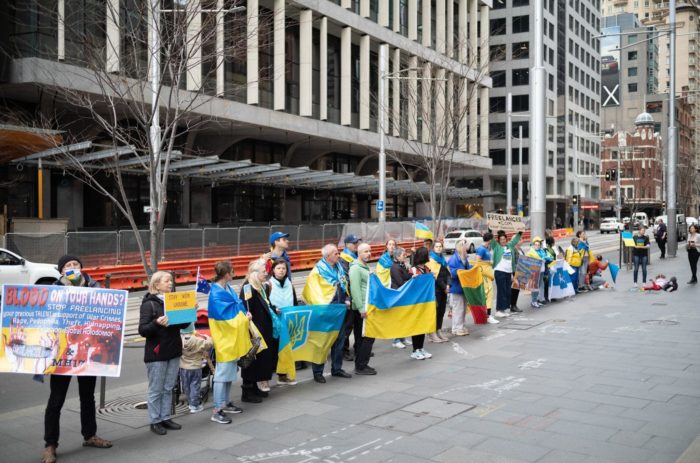
Freelancer’s dither and delay in taking action is not unique – many companies across the globe with operations in Russia have behaved similarly. As Professor Jeffrey A Sonnenfeld, the lead researcher on Yale University’s engagement tracker of businesses ceasing operations (or failing to do so) in Russia, told Investment Monitor in July, smokescreens and diversionary delays are just some of the tactics employed by companies lying about leaving the Russian market. Professor Sonnenfeld thinks that although some companies appear too concerned about taking a financial hit, it is likely this will backfire as reputational harm and stakeholder anger will grow in the long term. This is particularly concerning for Freelancer for whom disgruntled investors have sent its share price tumbling by 49% since 24 February.
Asked if Anton and his team could provide any advice to other activists tackling similar issues, Anton says that “the power of a personal meeting with executives is often underestimated.” This was especially true in the case of Canva whose withdrawal from Russia followed direct pressure from the Ukrainian embassy.
Anton added that these grassroots methods are “most effective when applied at the city-level where the head office is located.”
While grassroots campaigning has proven effective, Anton believes there is also a part for investors and the Government to play. He says that the Australian Government should “put pressure on Australian companies such as by sanctioning companies continuing to operate and profit in Russia” while investors should adapt their Environmental, Social and Governance (ESG) criteria and begin divesting away from companies continuing to trade in Russia.

Despite the challenges faced by Anton and other activists, he remains confident that eventually, more companies will follow the way of Canva and Atlassian. Companies still trading in Russia are in compromised positions and eventually will be forced to decide whether the costs of leaving the Russian market are greater than the costs they will incur from reputational damage, pressure from investors, and governments as they continue to bankroll Russia’s war machine.
 Klaidas Kazak is a British civil servant and a graduate from the School of Slavonic and East European Studies at University College London.
Klaidas Kazak is a British civil servant and a graduate from the School of Slavonic and East European Studies at University College London.

